| Reviews & Columns |
|
Reviews DVD TV on DVD Blu-ray 4K UHD International DVDs In Theaters Reviews by Studio Video Games Features Collector Series DVDs Easter Egg Database Interviews DVD Talk Radio Feature Articles Columns Anime Talk DVD Savant Horror DVDs The M.O.D. Squad Art House HD Talk Silent DVD
|
DVD Talk Forum |
|
|
| Resources |
|
DVD Price Search Customer Service #'s RCE Info Links |
|
Columns
|
|
|
Vitaphone Comedy Collection Vol. 1 - Roscoe ''Fatty'' Arbuckle/Shemp Howard (1932-1934), The
Warner Archive // Unrated // November 29, 2012
List Price: $35.98 [Buy now and save at Wbshop]
The Shorts:
Roscoe "Fatty" Arbuckle: Roscoe had played the vaudeville circuits on his own since he was 15 years old, and in 1913, at the age of 26, he was hired by Keystone. As the story goes, which is probably apocryphal, when Roscoe arrived at the lot no one stopped or questioned him so he wandered around the open stages and buildings. Someone opened a door and stepped out, turned to Roscoe and spit chewing tobacco juice on his new white pants. The man said "You, big boy, be here tomorrow morning at eight." Then he walked back inside. The man was Mack Sennett, head of the studio. Roscoe "Fatty" Arbuckle had broken into the movies, and who would turn out to be one of the great silent comedians. Vitaphone, a company purchased by Warner Brothers in 1925, released a lot of great shorts in the 30's and thanks to the Warner Archive Collection film fans have access to them. One of the sets that I was most excited to screen was the Vitaphone Comedy Collection Volume One, a two-disc release that includes the last six shorts that Roscoe "Fatty" Arbuckle filmed as well as over a dozen movies that include Shemp Howard, the man who would replace Curly in the Three Stooges in 1946. Between the two comedians there are some great shorts that are sure to entertain.
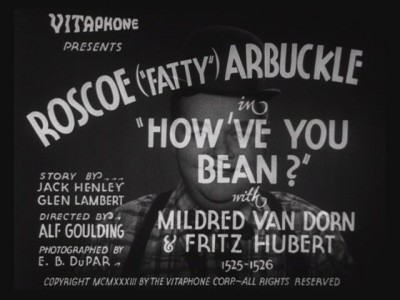
Of large build, yet surprisingly spry and able to take a fall, Roscoe obtained the nickname "Fatty" and was soon staring in one-reelers at Keystone. He quickly climbed up the comedy ladder. He made 29 films in 1913, and 46 in 1914. By 1915 he had graduated to two-reelers, and was a full-fledged star.
By 1916, Fatty who had started writing and directing his own films, and was ready to leave Keystone. He was making an amazing $500 a week at Keystone, but Chaplin was making $10,000 a week plus bonuses at that time. In the spring of 1916, Arbuckle took a trip to
These Comique shorts were incredibly popular, and based on their success
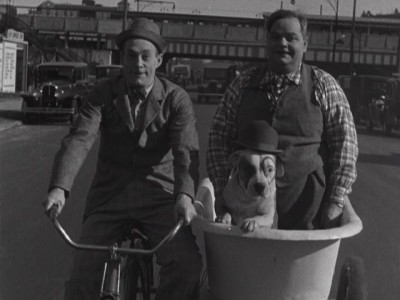
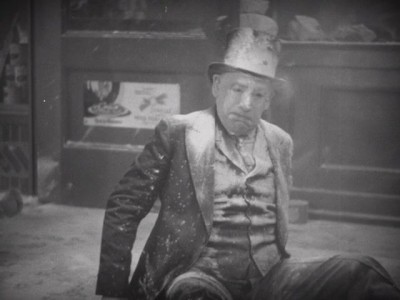
This was
Many state censor boards banned the showing of Arbuckle's films. William Hays, hired to lead a watch-dog group to police the ethics and morals of films coming out of the studios, banned Arbuckle from appearing in films... ten days after the comedian was acquitted on all charges.
His career was over... almost. Some of his friends gave him jobs directing, he used the pseudonym William Goodrich, and he was able to scrape out a living. Then in 1932 he got a break. Vitaphone hired him to star in a series of comedy shorts and it was clear that he hadn't lost his touch. He made six shorts and on the strength of those half dozen Warner Brothers signed him to a feature film contract on June 28th, 1933.
He died in bed that evening at the age of 46.
All six of Roscoe Arbuckle Vitaphone talkies are included in this set, and they're great. Even though he recycles gags from earlier comedies (a common practice in those days before DVD, TV, or even revival movie houses) Arbuckle is still creative and hilarious. The first one is one of the best. In Hey Pop! Arbuckle stars as a short order cook of amazing talent who adopts a young child that was left in the diner by his mother who is no longer able to take care of him. The first half has some great gags and shows off Arbuckle's juggling skills. He tosses a knife in the air, it spins a few rotations and then lands point-first in the butcher block and he then effortlessly flips a pancake over his head and catches it in the pan behind his back. When abandoned boy wanders into the kitchen Arbuckle decides to raise him, even though it means loosing his job. While the second part of the film will remind viewers of Chaplin's The Kid, the execution of Arbuckle and his ward running from officials who want to put him in an orphanage is drastically different. Here it's played for laughs and his ingenious ways of getting away from the police are hilarious.
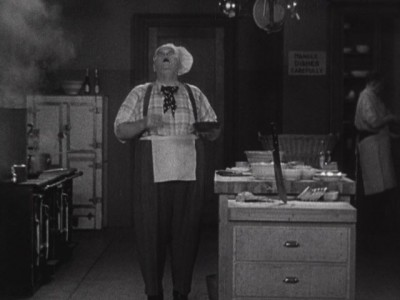
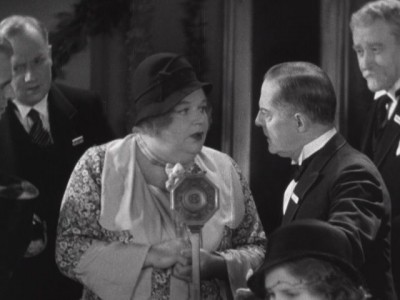
Another great offering is Have You Bean, which has Arbuckle and his partner, Fritz Hubert, running a grocery store. They take from gags from the Arbuckle film The Butcher Boy and expand on them beautifully, and the first act ends with an over-the-top flour fight that's not to be missed. There's also a nice twist near the end that works quite well.
As I said, all six of these films are fantastic, and the only one that doesn't quite measure up to the rest is Tomalito. This was the fourth Vitaphone movie that Arbuckle filmed, but it sat on a shelf and wasn't released until after he died. In this short Roscoe and his partner (Fritz Hubert again) travel south of the border to the town of
Those six films would make it worth the purchase price by itself, but there's a whole lot more. The other 13 shorts are devoted to appearances by Shemp Howard. Best known as "The Forgotten Stooge" (he replaced his brother, Curly Howard in the Three Stooges after Curly's stroke) Shemp had a solid career in
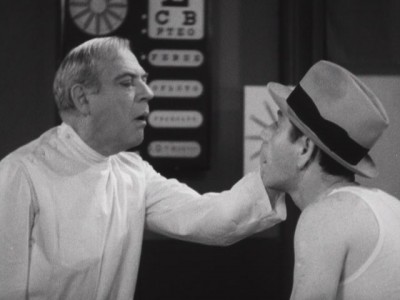
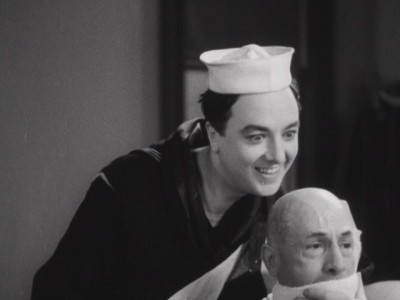
Having said that, he does not get star billing in any of them, even though he manages to steal the show in. Since he's not the focus, the results are varied. Sometime's he's limited to a short cameo (Paul Revere Jr.), but in others he gets as much screen time as the lead (Here Comes Flossie). Some of the best of these include I Scream where star Gus Shy plays an ice cream vendor who is mistakenly hired by an insurance company to break up a gang war. The number one thug is played by Shemp and the result is some wacky Stooge-like comedy.
Another stand out is Pugs and Kisses that casts Shemp as a lazy boxing trainer (Dopey Traynor) who teaches egotistical fighter Slug Mosconi (Lionel Stander) a lesson about fooling around with women after he looses a bout. It has some great gags that work well and it kept me laughing. The same can be said of Corn on the Cop where Shemp and Harry Gribon are a pair of hobos who decide to market axle grease as a corn remover, 'Happy Foot Salve.' They run into a police officer, but his wife mistakes them for her husband's nephews and mayhem ensues.
Though this latter section is uneven, there are some great shorts and none of them are really horrible. There are also appearances by Edgar Bergen & Charlie McCarthy (who star in one short), George Jessel, and an uncredited Jimmy Stewart in the final film.
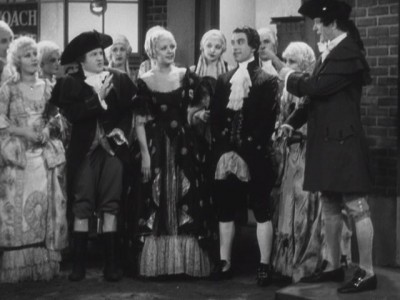
The movies included in this collection are:
Hey, Pop! (1932)
Buzzin' Around (1932)
How've You Bean? (1933)
Tomalio (1933)
Close Relations (1933)
In the Ddough (1933)
Paul Revere Jr. (1933)
Salt Water Daffy (1933)
Howd' ya Like That (1933)
I Scream (1934)
The Wrong, Wrong, Trail (1934)
Here Comes Flossie! (1933)
Pugs and Kisses (1934)
Mushrooms (1934)
Pure Feud (1934)
Corn on the Cop (1934)
Rambling 'round Radio Row (1934)
Very Close Veins (1934)
Art Trouble (1934)
The DVD:
Audio:
The mono audio track sounds very good for films of this age. There's a touch of background noise in some shorts, but nothing distracting. The voices are clear and it's easy to discern what's being said. What more could you want?
Video:
This full frame image is pretty amazing. None to these films have been restored, but they all look fantastic. There's some very minor print damage (spots and dirt) here and there but that's it. The contrast is excellent and the level of detail is surprisingly strong. Overall these are some great looking movies.
Extras:
None.
Final Thoughts:
This is a wonderful collection of some funny and entertaining shorts. The last six Roscoe "Fatty" Arbuckle movies are worth the price of admission alone, but the other shorts with Shemp Howard are very good too, though they vary a bit more in quality. This is a great set that has some hilarious comedy on it. Highly Recommended.
|
| Popular Reviews |
| Sponsored Links |
|
|
| Sponsored Links |
|
|
| Release List | Reviews | Shop | Newsletter | Forum | DVD Giveaways | Blu-Ray | Advertise |
|
Copyright 2024 DVDTalk.com All Rights Reserved. Legal Info, Privacy Policy, Terms of Use,
Manage Preferences,
Your Privacy Choices | |||||||













